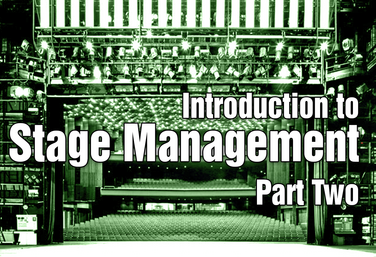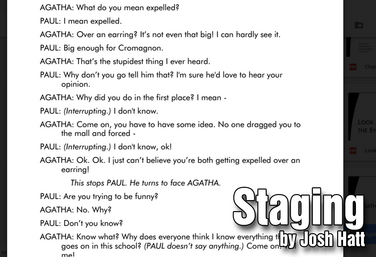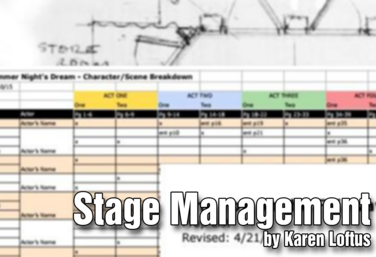Items tagged "Stage Management"
1 Course, 2 Units, 8 Lesson Plans, and 3 Resources tagged "Stage Management" for Drama Teachers.
Courses
Introduction to Stage Management Part Two
by Karen Loftus
Karen Loftus instructs this second course in stage management - a companion to Introduction to Stage Management Part One.
This course will review the major concepts covered in Introduction to Stage Management, and discuss the different types of technical rehearsals and how student stage managers prepare for and run them. You’ll learn how to teach your students to notate and call cues for a show. The course will also introduce strategies for student stage managers who work with student crews. It will discuss how you can provide the support your student stage managers need to be effective, and how that support helps to strengthen your overall program and theatre community.
Student stage managers start in the classroom, train during school productions, and can take these newly discovered and acquired skills on with them to colleges and careers and theatre (and beyond)!
Read More...
Read Less...
Units
Staging
by Josh Hatt
This is a mini-unit on staging. Along with the driving question for the unit, students will explore about how staging affects the performance. Students will draw a plot design (ground plan) to emphasize the need to plan where scenic elements will be placed. They will also practice taking cues from the script, in order to create staging.
Read More...
Read Less...
Stage Management
by Karen Loftus
A unit on stage management is a great way to link technical theatre, acting, and even directing. We spend so much of our class time on performance-related projects and, when we do address technical theatre, we often do so by talking about design.
Why not introduce your students to a skill set that not only benefits your productions by ensuring a strong backstage crew and smooth production process, but also benefits the students individually? Through exploring stage management, students learn skills such as analytical thinking, organization, teamwork, and problem solving.
Read More...
Read Less...
Lesson Plans
Stage Management: Know the Details
by Anna Porter
Students will learn the details a stage manager must be aware of as well as how to communicate those details in a clear and productive way.
Students analyze a work of art to find the visual details required for that “production” and create an organized list to communicate those details. Students then apply those skills to a written script as the stage manager.
Read More...
Read Less...
Stage Managers in Rehearsal
by Karen Loftus
Stage Managers have numerous responsibilities in the production process. This lesson will focus in on the things a stage manager does prior to and during blocking rehearsal from preparing for rehearsal, to taking blocking notation, to communicating important notes to other members of the production.
Read More...
Read Less...
Properties & Prop Design
by Karen Loftus
In this lesson, students will take what they learn about the different types of props and how props are created or acquired in order to apply it to a specific project. Using their critical thinking skills, they’ll have to invent, design, and create a science fiction style prop for a hypothetical show.
Read More...
Read Less...
Creating Ambiance
by Holly Beardsley
To create ambiance is to define the feel, mood, and tone of a play. Light and sound can change ambiance drastically. A castle in dark shadows will look gloomy and mysterious, while a castle in bright light will appear magical. In this lesson, students will analyze the use of sound to create and change the ambiance of a production.
Read More...
Read Less...
Stage Management Calls Game
by Karen Loftus
It’s important for students to be aware of both onstage and offstage theatre roles. But applying stage management tasks to a classroom setting is not always easy to do. The Stage Management Calls Game gives students a practical way to hear and react to the various things a stage manager may say during a rehearsal or technical rehearsal.
Read More...
Read Less...
Technical Theatre Performance Challenge
by Kerry Hishon
Students will work in small groups to devise a one-minute long theatrical piece from a prompt. They will create a performance, create a prompt script, assign Stage Manager and Technical Operator roles, rehearse the piece, and perform it for the rest of the class. Depending on your time allowance, this lesson could be completed in one class using only items found in the classroom; or this lesson can be spread over four classes (one class to assign and plan, one class to rehearse, one class as a technical/dress rehearsal, and one class as a performance and discussion/reflection class).
Read More...
Read Less...
Running List Exercise
by Kerry Hishon
To learn the importance of an organized backstage – through discussion, solving issues through performance, and applying knowledge.
Read More...
Read Less...
Same Show, Different Stages
by Kerry Hishon
The objective of this lesson is to introduce, compare, and contrast different types of theatrical performance venues/stages.
Read More...
Read Less...
Resources
Stage Management Staff Breakdown
Here is one way to set up a stage management staff at your school. You know your students the best and you know that some can handle more responsibility and some may be better suited to certain tasks. Make sure your PSM is the one who represents the team especially to the actors.
Read More...
Read Less...
Creative Staging Part 1
Attachments
Creative Staging Part 2
Attachments
© Copyright 2015-2025 Theatrefolk




